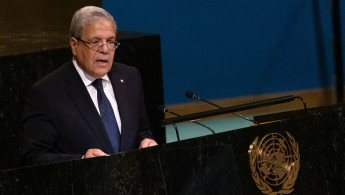Tunisia president sacks FM Jerandi, fourth minister let go since start of 2023
Tunisian President Kais Saied dismissed his fourth minister of this year on Tuesday when he fired foreign minister Othman Jerandi.
"Today, my duties as Minister of Foreign Affairs ended after 3 years, and, amid a delicate circumstance, my only aim was the supreme interest of Tunisia," wrote Jerandi on his Twitter page, thanking the president, prime minister, and fellow ministers.
"Wherever I am, I will remain in the service of this country…Tunisia remains witness to those who loved it and were loyal to it."
انتهت اليوم مهامي كوزير للشؤون الخارجية بعد سنوات 3 ، وفي ظرف دقيق بوصلتي الوحيدة فيه كانت مصلحة تونس العليا. كل التقدير لسيادة الرئيس على ثقته وللسيدة رئيسة الحكومة ولإطارات الوزارة.
— Othman Jerandi (@OJerandi) February 7, 2023
سأظل حيثما كنت، في خدمة هذا الوطن. كلنا عابرون وتبقى تونس شاهدة على من أحبها وأخلص لها. pic.twitter.com/yJxej5szzr
Tunisia’s ambassador to Belgium and the European Union, Nabil Ammar, will replace him, the presidency said in a statement.
The statement did not provide a reason for Saied’s decision to dismiss Jerandi.
The president has already replaced his trade, agriculture and education ministers this year, but Jerandi, who had served as foreign minister since September 2020, is the most senior official to lose his post.
Former diplomat Abullah al-Obaidi believed Jerandi’s dismissal came due to a failure in Tunisian diplomacy.
"The dismissal comes based on the results of foreign policy that have led to Tunisia’s isolation," al-Obaidi told The New Arab’s sister site, Al-Araby Al-Jadeed.
"For nearly two years, Saied has not left the country for visits and bilateral meetings, but rather most of his visits have been multilateral."
The diplomat said Saied was frustrated that he could not meet with his US counterpart, Joe Biden, during a visit to Washington in December, but rather met with US Secretary of State Anthony Blinken, saying he blamed Jerandi for this shortfall.
He said time was needed to see if the ministerial swap will change anything on an external level for Tunisia, stressing that the country’s foreign policy was not tied to just one person – in reference to Saied – but rather had repercussions on a national level.
"The president's statements have repercussions on [Tunisia’s] foreign policy. The great setback, the political fragmentation, and the failure to value Tunisia's geostrategic position are all factors that contributed to this failure."
The Tunisian parliamentary election, marked by a low turnout, further challenges the legitimacy of Kais Saied's political project, despite his efforts to cement one-man rule. https://t.co/FrJ6fsJtVL
— The New Arab (@The_NewArab) February 5, 2023
Deepening political divisions have wracked Tunisia since Saied launched a dramatic power grab in July 2021, which his critics and opponents have called a coup.
He sacked the government, froze parliament and seized far-reaching executive powers, pushing through a new constitution in a referendum in July last year that defanged the parliament and installed a hyper-presidential system.
Tunisia has faced mounting economic woes in recent months, with repeated strikes by teachers and transportation workers along with shortages of basic goods, including milk.
Just 11.4 percent of Tunisians turned out for a second round of voting in January for the now toothless legislature after opposition parties called for a boycott.
The moves come in the shadow of Tunisia's drawn-out negotiations with the International Monetary Fund for a bailout worth nearly $2 billion.
(Agencies, The New Arab)





 Follow the Middle East's top stories in English at The New Arab on Google News
Follow the Middle East's top stories in English at The New Arab on Google News


